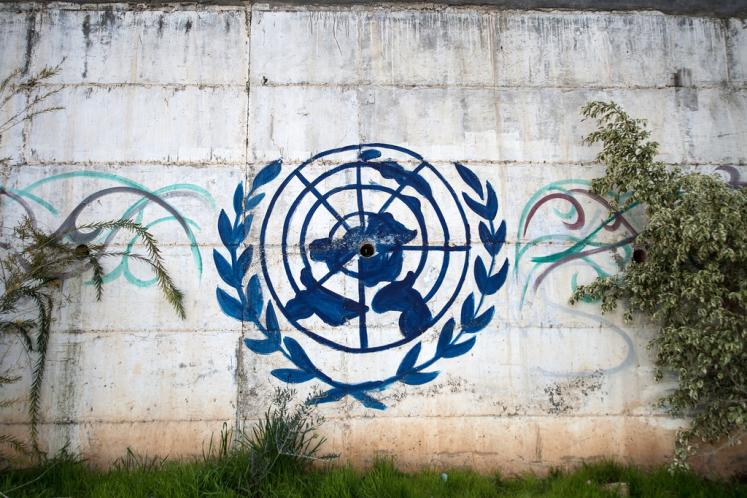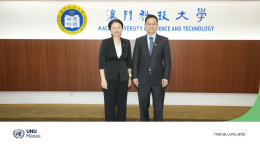Marking United Nations Day, this piece by Dr. Zina Nimeh, Associate Professor of Public Policy and Social Protection at UNU-MERIT, highlights a new collaboration between UNU-MERIT and UNRWA that brings academic research and policy practice together. Through engagement with MPP students, the initiative is an example of how evidence-based research can directly inform UN agency work and promote institutional resilience during times of crisis. It reflects UNU-MERIT’s broader mission to connect scholarship with action and to support the UN system through knowledge, innovation, and education.
United Nations Day, observed annually on October 24, commemorates the founding of the UN in 1945 and encourages reflection on the organisation's enduring commitment to international peace, development, and human rights. In this spirit, we reflect on the UN Relief and Works Agency for Palestine Refugees in the Near East (UNRWA), which has faced an existential crisis due to political and financial challenges.
In the past year, UNRWA has grappled with severe funding shortfalls and, at one point, warned it might have to cease operations unless urgent steps were taken to address political challenges to its legitimacy. In 2024, concerted actions were made to restrict UNRWA's operations in certain regions, highlighting the intense and unprecedented pressure on its mandate and ability to function. This reality underscores more than ever the necessity of rigorous academic inquiry into the workings of UN agencies. Empirical, evidence-based research is essential to illuminate the vital roles played by agencies such as UNRWA and offer informed pathways forward during periods of institutional strain. UN Day, therefore, serves as a particularly apt moment to consider how scholarly analysis and policy research can reinforce and support the United Nations' mission when it faces heightened external pressures.
From Classroom to Policy: A Student Centred Collaboration
During the 2024/2025 academic year, a collaborative effort between UNU-MERIT and UNRWA was developed, following student interest. It began with a guest lecture by UNRWA staff from Brussels to the MPP programme, which opened a discussion of the agency's most significant challenges. Three Master's students at UNU-MERIT, after consulting with UNRWA and under joint academic supervision, set out to investigate themes that would explain UNRWA's critical functions under duress. The result was a series of three theses and accompanying policy briefs derived from the students' thesis research. This evidence-based partnership bridged academic research and policy needs, demonstrating how graduate researchers can enlighten an agency's understanding of its challenges. The three policy briefs elaborated under this partnership explore how UNRWA can transform and preserve its mandate amidst funding pressures, political difficulties, and challenging operational facts.
Policy Brief Highlights: UNRWA's Challenges and Responses
1. UNRWA's Social Protection Resilience in the West Bank
The first brief, "Caught Between Politics and Need: Sustaining UNRWA's Social Protection Delivery in the West Bank", explores how UNRWA's social safety-net services have been strained by political and security volatility in the West Bank. Despite growing movement restrictions, budget cuts, and other obstacles, UNRWA's Relief and Social Services programme is a lifeline for refugees in extreme poverty. The brief recommends strengthening shock-responsive social protection systems to address emergencies better, improving coordination with humanitarian actors to address gaps in support, and diversifying funding sources to reduce over-reliance on volatile donations. These actions would enhance UNRWA's ability to protect vulnerable refugees even in an increasingly precarious environment.
2. Human Rights Education under Institutional Pressures
The second brief, "Learning Rights, Living Rights: Insights from UNRWA’s HRCRT Programme- A Multi-Level Approach", examines UNRWA's Human Rights, Conflict Resolution and Tolerance (HRCRT) education programme. The research examines that while human-rights and tolerance education were introduced into all UNRWA schools, the brief also delineates continuing challenges undermining its impact. Political pressure and donor politics have led to a depoliticised curriculum, sometimes divorcing lessons from the reality of refugees' experiences. Limited evaluation tools also render long-term effects hard to measure. The research outcome recommends developing participatory evaluation mechanisms involving communities and teachers in assessing the program, investing in continual teacher training and support to help teachers deal with sensitive topics, and guarding autonomy so that human rights education can be maintained, relevant and authentic amidst external pressure. These steps would allow the HRCRT programme to move from theoretical rights education to empowering students to claim and advocate for their rights in practice. Read the full policy brief here.
3. Strengthening UN Agency Coordination on Refugee Education:
The third brief – "Strengthening Multilateral Cooperation on Refugee Education: Lessons from UNRWA, UNHCR, and UNESCO", looks beyond UNRWA, analysing how it operates in relation to the UN's broader refugee and education apparatus. It notes that while the agencies have a shared goal of expanding quality education to refugees, disjointed coordination among them has compromised effectiveness. Political sensitivities and overlapping mandates have resulted in ad hoc coordination instead of complementary approaches. The brief calls for more formal coordination mechanisms among those agencies – such as joint planning, sharing of information, and clearly defined roles – to reduce service gaps and increase educational continuity for Palestinian refugees. It also calls for multi-year, predictable funding commitments for refugee education. More stable funding would enable long-term planning and reduce competition among agencies, finally ensuring that yearly budget crises do not disrupt refugee children's education.
Bridging Policy and Research in Times of Crisis
This student-driven initiative demonstrates the crucial role of translating academic research into actionable policy, particularly during institutional crises. Each policy brief explores a distinct aspect of UNRWA's mandate under immense pressure, delivering social protection during conflict, safeguarding the integrity of human rights education, or coordinating with partner agencies amid overlapping responsibilities.
These studies illustrate that even as UNRWA's legitimacy, funding, and capacity are in question, there is still room for constructive, evidence-based engagement. By drawing recommendations from research and evidence, the students' work provides perspectives for strengthening resilience and effectiveness.
As we mark UN Day, the engagement between UNU-MERIT and UNRWA is a positive example of dialogue in action. It illustrates how universities and UN agencies can learn from each other, especially where forces outside their control compress an agency's mandate. In an era of strained multilateralism, misinformation, politicization, and short-termism, evidence-based research is not a luxury; it is a necessity and a responsibility. The fate of UN agencies like UNRWA, and how the international community will respond to attempts of weakening or undermining their mandates will have profound implications for the future of multilateralism, global cooperation, humanitarian protection, and the very ethos of shared global solidarity.
Last but not least, UN Day is not a remembrance of the UN's past, but a construction of its future – through informed commitment, critical inquiry, and common dedication to furthering the principles behind the UN's mandates.
Suggested citation: Dr. Zina Nimeh. "Bridging Research and Policy amid a Mandate in Crisis ," United Nations University, UNU-MERIT, 2025-10-24, https://unu.edu/merit/article/bridging-research-and-policy-amid-mandate-crisis.




